全国教育硕士英语(毛大威)学生用书参考 1-5
- 格式:doc
- 大小:272.00 KB
- 文档页数:38
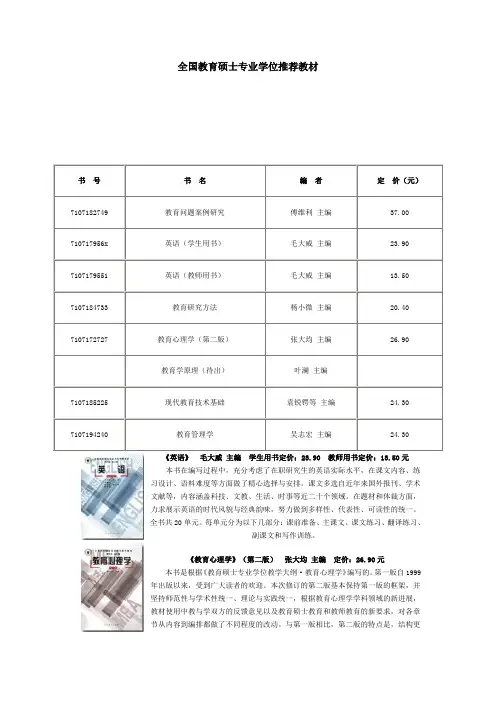
全国教育硕士专业学位推荐教材书号书名编者定价(元)7107182749 教育问题案例研究傅维利主编37.00 710717956x 英语(学生用书)毛大威主编23.90 7107179551 英语(教师用书)毛大威主编13.50 7107184733 教育研究方法杨小微主编20.40 7107172727 教育心理学(第二版)张大均主编26.90教育学原理(待出)叶澜主编7107185225 现代教育技术基础袁锐锷等主编24.30 7107194240 教育管理学吴志宏主编24.30《英语》毛大威主编学生用书定价:23.90 教师用书定价:13.50元本书在编写过程中,充分考虑了在职研究生的英语实际水平,在课文内容、练习设计、语料难度等方面做了精心选择与安排。
课文多选自近年来国外报刊、学术文献等,内容涵盖科技、文教、生活、时事等近二十个领域。
在题材和体裁方面,力求展示英语的时代风貌与经典韵味,努力做到多样性、代表性、可读性的统一。
全书共20单元。
每单元分为以下几部分:课前准备、主课文、课文练习、翻译练习、副课文和写作训练。
《教育心理学》(第二版)张大均主编定价:26.90元本书是根据《教育硕士专业学位教学大纲·教育心理学》编写的。
第一版自1999年出版以来,受到广大读者的欢迎。
本次修订的第二版基本保持第一版的框架,并坚持师范性与学术性统一、理论与实践统一,根据教育心理学学科领域的新进展,教材使用中教与学双方的反馈意见以及教育硕士教育和教师教育的新要求,对各章节从内容到编排都做了不同程度的改动。
与第一版相比,第二版的特点是,结构更合理,内容更完善,理论联系实际更紧密,文字表述的逻辑性更强。
全书内容大致分为基本理论、学习心理、德育与美育心理、教学心理、教育社会心理五部分,共十六章。
《教育研究方法》杨小微主编定价:20.40元本书针对教育专业硕士学位的特点,深入浅出地论述了教育研究的一般原理、过程与具体方法,而不再是老生常谈,重复论述在职教师在大学里已经学过的东西。
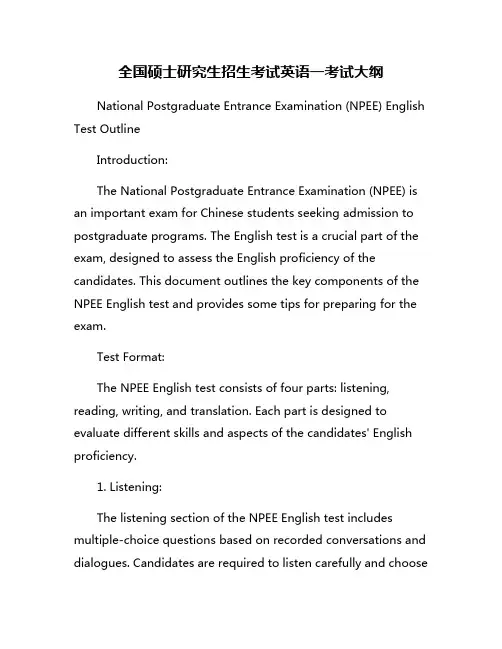
全国硕士研究生招生考试英语一考试大纲National Postgraduate Entrance Examination (NPEE) English Test OutlineIntroduction:The National Postgraduate Entrance Examination (NPEE) is an important exam for Chinese students seeking admission to postgraduate programs. The English test is a crucial part of the exam, designed to assess the English proficiency of the candidates. This document outlines the key components of the NPEE English test and provides some tips for preparing for the exam.Test Format:The NPEE English test consists of four parts: listening, reading, writing, and translation. Each part is designed to evaluate different skills and aspects of the candidates' English proficiency.1. Listening:The listening section of the NPEE English test includes multiple-choice questions based on recorded conversations and dialogues. Candidates are required to listen carefully and choosethe correct answer based on the information presented in the recordings.Tip: Practice listening to different accents and speeds of English speakers to improve your listening skills.2. Reading:The reading section of the NPEE English test includes multiple-choice questions, fill-in-the-blank exercises, and essay questions. Candidates are required to read and understand passages on various topics, including literature, science, and current affairs.Tip: Read a variety of English texts, including newspapers, magazines, and academic journals, to improve your reading comprehension skills.3. Writing:The writing section of the NPEE English test requires candidates to write essays on assigned topics. Candidates are assessed on their ability to present arguments, organize ideas, and use correct grammar and vocabulary.Tip: Practice writing essays on different topics and have them reviewed by a teacher or tutor to improve your writing skills.4. Translation:The translation section of the NPEE English test requires candidates to translate sentences from Chinese to English and vice versa. Candidates are assessed on their ability to accurately convey the meaning of the original text in the target language.Tip: Practice translating sentences and passages between Chinese and English to improve your translation skills.Preparation Tips:1. Start preparing early: Begin studying for the NPEE English test as soon as possible to give yourself enough time to improve your English proficiency.2. Practice regularly: Make a study schedule and practice listening, reading, writing, and translation exercises on a daily basis.3. Seek help: Consider hiring a tutor or attending English classes to receive personalized instruction and feedback on your language skills.4. Take practice tests: Familiarize yourself with the format and types of questions on the NPEE English test by taking practice tests and reviewing your answers.5. Stay confident: Believe in your abilities and stay positive throughout your preparation and during the exam.In conclusion, the NPEE English test is an important component of the National Postgraduate Entrance Examination and requires candidates to demonstrate their English proficiency in listening, reading, writing, and translation. By following the tips outlined in this document and dedicating time and effort to your preparation, you can improve your chances of success on the exam. Good luck!。
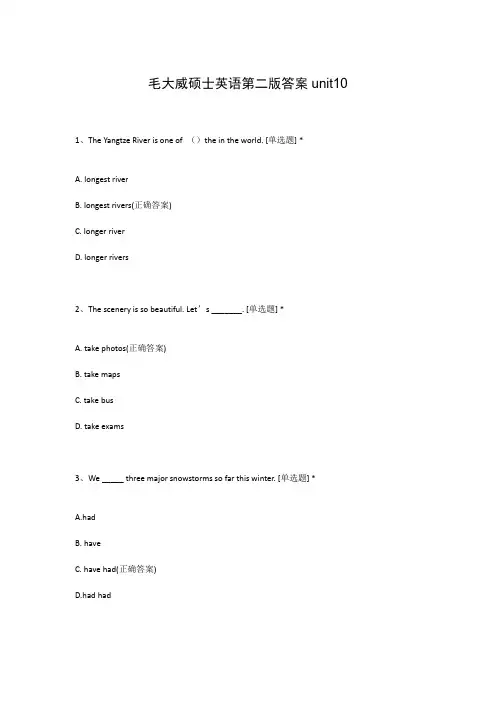
毛大威硕士英语第二版答案unit101、The Yangtze River is one of ()the in the world. [单选题] *A. longest riverB. longest rivers(正确答案)C. longer riverD. longer rivers2、The scenery is so beautiful. Let’s _______. [单选题] *A. take photos(正确答案)B. take mapsC. take busD. take exams3、We _____ three major snowstorms so far this winter. [单选题] *A.hadB. haveC. have had(正确答案)D.had had4、In the future, people ______ a new kind of clothes that will be warm when they are cold, and cool when they’re hot.()[单选题] *A. wearB. woreC. are wearingD. will wear(正确答案)5、I am worried about my brother. I am not sure _____ he has arrived at the school or not. [单选题] *A. whether(正确答案)B. whatC. whenD. how6、72.—? ? ? ? ? ? ? ? ? ? ? ??—Yes, please. I want a sweater. [单选题] *A.How muchB.Can I help you(正确答案)C.Excuse meD.What will you take7、There may be something wrong with her _______. She can’t see things clearly. [单选题] *A. eyes(正确答案)B. earsC. mouthD. nose8、He made ______ for an old person on the bus. [单选题] *A. room(正确答案)B. roomsC. a roomD. some rooms9、Alice is fond of playing ____ piano while Henry is interested in listening to ___ music. [单选题] *A. the, /(正确答案)B. the, theC. the, aD. /, the10、--_______ are the birds doing?--They are singing in a tree. [单选题] *A. WhoB. What(正确答案)C. HowD. Where11、63.There will be? ? ? ? ??? water on the road after the heavy rain. [单选题] * A.too much(正确答案)B.much tooC.too manyD.many too12、You needn’t _______ me. I’m old enough to take care of myself. [单选题] *A. worry about(正确答案)B. write downC. put awayD. wake up13、He was born in Canada, but he has made China his _______. [单选题] *A. familyB. addressC. houseD. home(正确答案)14、27.Will it ______ warm in the room? [单选题] *A.areB.be(正确答案)C.isD.going to be15、—Do you like to watch Hero?—Yes. I enjoy ______ action movies. ()[单选题] *A. watchB. watching(正确答案)C. to watchD. watches16、So many people will _______ to their work after the Spring Festival. [单选题] *A. get inB. get onC. get offD. get back(正确答案)17、My brother will come to see me tomorrow. I’ll meet?_______ at the airport. [单选题] *A. herB. youC. him(正确答案)D. them18、100.The bus can ______ you to the Great Wall. [单选题] *A.leaveB.take(正确答案)C.changeD.spend19、--Do you know _______ girl with long curly hair?--Yes. She is Mary. She plays _______ piano very well. [单选题] *A. a; /B. the; /C. the; the(正确答案)D. a; the20、54.—________?—Yes, please. I'd like some beef. [单选题] *A.What do you wantB.May I try it onC.Can I help you(正确答案)D.What else do you want21、73.The moonlight goes ____ the window and makes the room bright. [单选题] * A.acrossB.through(正确答案)C.overD.in22、This species has nearly ()because its habitat is being destroyed. [单选题] *A. used upB. died out(正确答案)C. gone upD. got rid of23、45.—Let's make a cake ________ our mother ________ Mother's Day.—Good idea. [单选题] *A.with; forB.for; on(正确答案)C.to; onD.for; in24、—Where did you get the book?—From my friend. I ______ it three days ago. ()[单选题] *A. lentB. borrowed(正确答案)C. keptD. returned25、38.—Do you have ________else to say for your mistake?—________but sorry. [单选题] *A.anything; SomethingB.something; EverythingC.anything; Nothing(正确答案)D.something; Anything26、What’s the price and what sort of _______ do you offer? [单选题] *A. advantageB. accountC. displayD. discount(正确答案)27、Which do you enjoy to spend your weekend, fishing or shopping? [单选题] *China'shigh-speed railways _________ from 9,000 to 25,000 kilometers in the past fewyears.A. are growing(正确答案)B. have grownC. will growD. had grown28、Mr. Wang is coming to our school. I can’t wait to see _______. [单选题] *A. herB. him(正确答案)C. itD. them29、_____ yuan a month _____ not enough for a family of three to live on today. [单选题] *A. Five hundred; is(正确答案)B. Five hundreds; areC. Five hundred; areD.Five hundreds; is30、It usually takes him about 15 minutes _______ his bike to school. [单选题] *A. ridesB. ridingC. rideD. to ride(正确答案)。
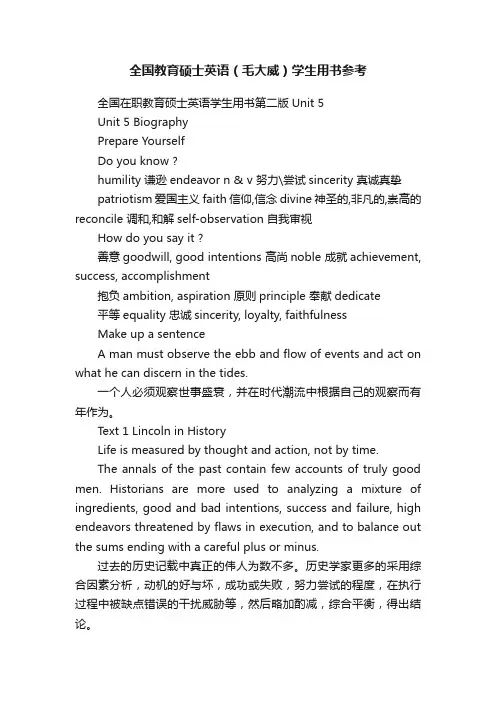
全国教育硕士英语(毛大威)学生用书参考全国在职教育硕士英语学生用书第二版Unit 5Unit 5 BiographyPrepare YourselfDo you know ?humility 谦逊endeavor n & v 努力\尝试sincerity 真诚真挚patriotism 爱国主义faith 信仰,信念divine 神圣的,非凡的,崇高的reconcile 调和,和解self-observation 自我审视How do you say it ?善意goodwill, good intentions 高尚noble 成就achievement, success, accomplishment抱负ambition, aspiration 原则principle 奉献dedicate平等equality 忠诚sincerity, loyalty, faithfulnessMake up a sentenceA man must observe the ebb and flow of events and act on what he can discern in the tides.一个人必须观察世事盛衰,并在时代潮流中根据自己的观察而有年作为。
Text 1 Lincoln in HistoryLife is measured by thought and action, not by time.The annals of the past contain few accounts of truly good men. Historians are more used to analyzing a mixture of ingredients, good and bad intentions, success and failure, high endeavors threatened by flaws in execution, and to balance out the sums ending with a careful plus or minus.过去的历史记载中真正的伟人为数不多。
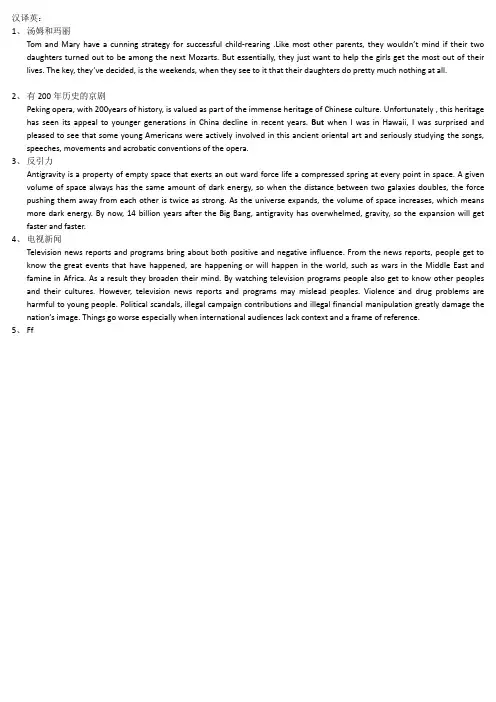
汉译英:1、汤姆和玛丽Tom and Mary have a cunning strategy for successful child-rearing .Like most other parents, they wouldn’t mind if their two daughters turned out to be among the next Mozarts. But essentially, they just want to help the girls get the most out of their lives. The key, they’ve decided, is the weekends, when they see to it that their daughters do pretty much nothing at all.2、有200年历史的京剧Peking opera, with 200years of history, is valued as part of the immense heritage of Chinese culture. Unfortunately , this heritage has seen its appeal to younger generations in China decline in recent years. But when I was in Hawaii, I was surprised and pleased to see that some young Americans were actively involved in this ancient oriental art and seriously studying the songs, speeches, movements and acrobatic conventions of the opera.3、反引力Antigravity is a property of empty space that exerts an out ward force life a compressed spring at every point in space. A given volume of space always has the same amount of dark energy, so when the distance between two galaxies doubles, the force pushing them away from each other is twice as strong. As the universe expands, the volume of space increases, which means more dark energy. By now, 14 billion years after the Big Bang, antigravity has overwhelmed, gravity, so the expansion will get faster and faster.4、电视新闻Television news reports and programs bring about both positive and negative influence. From the news reports, people get to know the great events that have happened, are happening or will happen in the world, such as wars in the Middle East and famine in Africa. As a result they broaden their mind. By watching television programs people also get to know other peoples and their cultures. However, television news reports and programs may mislead peoples. Violence and drug problems are harmful to young people. Political scandals, illegal campaign contributions and illegal financial manipulation greatly damage the nation’s image. Things go worse especially when international audiences lack context and a frame of reference.5、Ff。
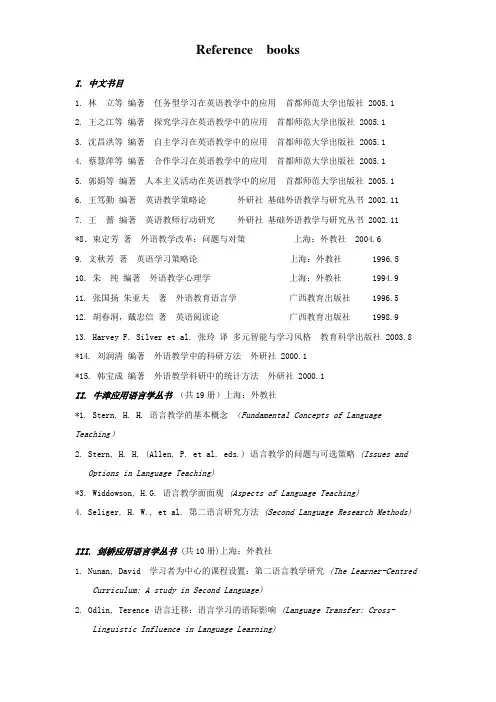
Reference booksI. 中文书目1. 林立等编著任务型学习在英语教学中的应用首都师范大学出版社 2005.12. 王之江等编著探究学习在英语教学中的应用首都师范大学出版社 2005.13. 沈昌洪等编著自主学习在英语教学中的应用首都师范大学出版社 2005.14. 蔡慧萍等编著合作学习在英语教学中的应用首都师范大学出版社 2005.15. 郭娟等编著人本主义活动在英语教学中的应用首都师范大学出版社 2005.16. 王笃勤编著英语教学策略论外研社基础外语教学与研究丛书 2002.117. 王蔷编著英语教师行动研究外研社基础外语教学与研究丛书 2002.11*8.束定芳著外语教学改革:问题与对策上海:外教社 2004.69. 文秋芳著英语学习策略论上海:外教社 1996.510. 朱纯编著外语教学心理学上海:外教社 1994.911. 张国扬朱亚夫著外语教育语言学广西教育出版社 1996.512. 胡春洞,戴忠信著英语阅读论广西教育出版社 1998.913. Harvey F. Silver et al. 张玲译多元智能与学习风格教育科学出版社 2003.8 *14. 刘润清编著外语教学中的科研方法外研社 2000.1*15. 韩宝成编著外语教学科研中的统计方法外研社 2000.1II. 牛津应用语言学丛书(共19册)上海:外教社*1. Stern, H. H. 语言教学的基本概念(Fundamental Concepts of Language Teaching)2. Stern, H. H. (Allen, P. et al. eds.) 语言教学的问题与可选策略(Issues andOptions in Language Teaching)*3. Widdowson, H.G. 语言教学面面观(Aspects of Language Teaching)4. Seliger, H. W., et al. 第二语言研究方法(Second Language Research Methods)III. 剑桥应用语言学丛书(共10册)上海:外教社1. Nunan, David 学习者为中心的课程设置:第二语言教学研究(The Learner-CentredCurriculum: A study in Second Language)2. Odlin, Terence 语言迁移:语言学习的语际影响(Language Transfer: Cross-Linguistic Influence in Language Learning)*3. O’Malley, J. Michael & Chamot, Anna Uhl 第二语言习得的学习策略(Learning Strategies in Second Language)IV。
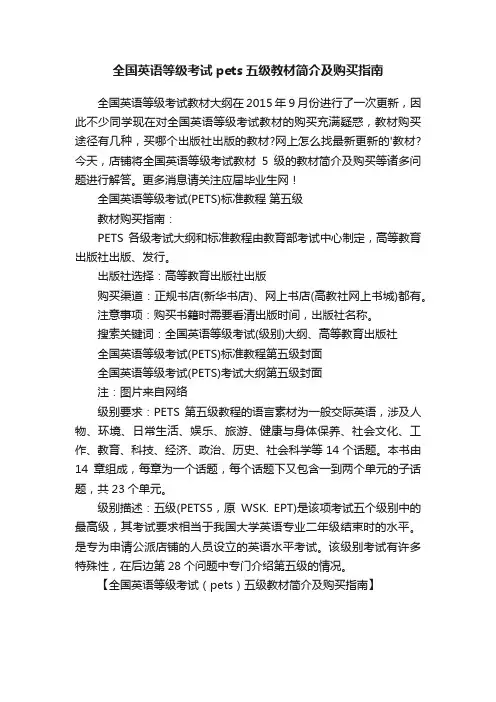
全国英语等级考试pets五级教材简介及购买指南
全国英语等级考试教材大纲在2015年9月份进行了一次更新,因此不少同学现在对全国英语等级考试教材的购买充满疑惑,教材购买途径有几种,买哪个出版社出版的教材?网上怎么找最新更新的'教材?今天,店铺将全国英语等级考试教材5级的教材简介及购买等诸多问题进行解答。
更多消息请关注应届毕业生网!
全国英语等级考试(PETS)标准教程第五级
教材购买指南:
PETS各级考试大纲和标准教程由教育部考试中心制定,高等教育出版社出版、发行。
出版社选择:高等教育出版社出版
购买渠道:正规书店(新华书店)、网上书店(高教社网上书城)都有。
注意事项:购买书籍时需要看清出版时间,出版社名称。
搜索关键词:全国英语等级考试(级别)大纲、高等教育出版社
全国英语等级考试(PETS)标准教程第五级封面
全国英语等级考试(PETS)考试大纲第五级封面
注:图片来自网络
级别要求:PETS第五级教程的语言素材为一般交际英语,涉及人物、环境、日常生活、娱乐、旅游、健康与身体保养、社会文化、工作、教育、科技、经济、政治、历史、社会科学等14个话题。
本书由14章组成,每章为一个话题,每个话题下又包含一到两个单元的子话题,共23个单元。
级别描述:五级(PETS5,原WSK. EPT)是该项考试五个级别中的最高级,其考试要求相当于我国大学英语专业二年级结束时的水平。
是专为申请公派店铺的人员设立的英语水平考试。
该级别考试有许多特殊性,在后边第28个问题中专门介绍第五级的情况。
【全国英语等级考试(pets)五级教材简介及购买指南】。
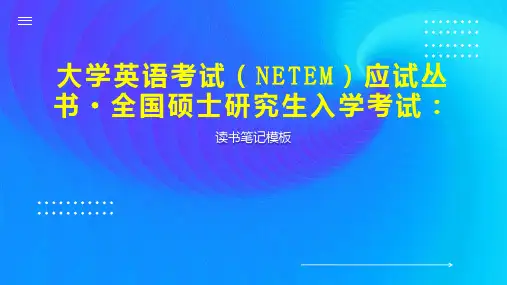
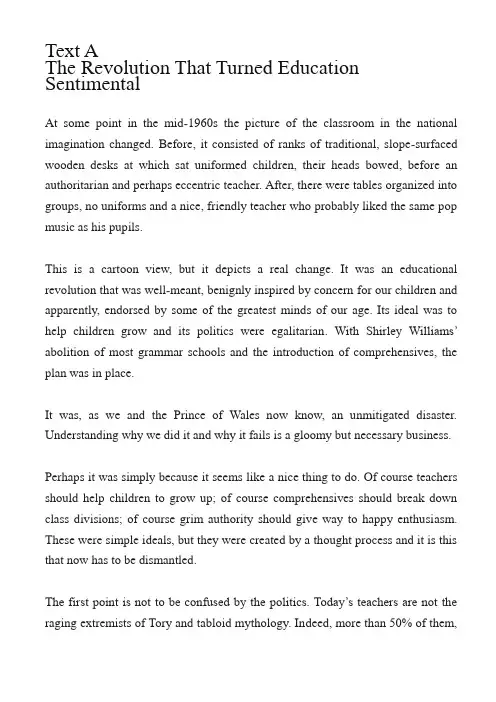
Text AThe Revolution That Turned Education SentimentalAt some point in the mid-1960s the picture of the classroom in the national imagination changed. Before, it consisted of ranks of traditional, slope-surfaced wooden desks at which sat uniformed children, their heads bowed, before an authoritarian and perhaps eccentric teacher. After, there were tables organized into groups, no uniforms and a nice, friendly teacher who probably liked the same pop music as his pupils.This is a cartoon view, but it depicts a real change. It was an educational revolution that was well-meant, benignly inspired by concern for our children and apparently, endorsed by some of the greatest minds of our age. Its ideal was to help children grow and its politics were egalitarian. With Shirley Williams’ abolition of most grammar schools and the introduction of comprehensives, the plan was in place.It was, as we and the Prince of W ales now know, an unmitigated disaster. Understanding why we did it and why it fails is a gloomy but necessary business.Perhaps it was simply because it seems like a nice thing to do. Of course teachers should help children to grow up; of course comprehensives should break down class divisions; of course grim authority should give way to happy enthusiasm. These were simple ideals, but they were created by a thought process and it is this that now has to be dismantled.The first point is not to be confused by the politics. Today’s teachers are not the raging extremists of Tory and tabloid mythology. Indeed, more than 50% of them,according to one estimate, vote Conservative.This real root of the problem is inadequately understood and misapplied theory. Take, for example, the specific issue raised by the prince-why Shakespeare was not being widely and enthusiastically taught. The immediate reason is that educationists and teachers have colluded on a view that contemporary and multicultural work is more relevant and that Shakespeare, indeed all pre-1990 literature, is left to be inaccessible to less able pupils.At one level this is a result of the “child-centered”philosophy defined by the Plowden report in the 1960s. Lady Plowden’s committee led us all into unstructured classrooms and the accompanying glorification of childish ignorance. It effectively wrote the script for the liberal education establishment that has dominated our schools ever since.Keeping the Plowden faith alive now is the wildly misguided figure of Frank Smith, preacher of the “real books” approach to reading. This is the liberal theory in its most decadent phase: children are expected to read almost solely by being in the presence of books. Some benign osmosis is supposed to function. What Smith and his followers cannot see is that reading is an artificial activity, an arbitrary code demanded by our culture.Emerging from ill-digested Freud, which, in turn, was modified Nietzsche, and a corrupted version of Rousseau, the beliefs of these people aspired to turn education into a process whereby the child dictated the pace. The whole educational emphasis swung from transmitting a culture to nurturing individual development. It encouraged sentimentality, the primary emotional evil of our day, and a sort of caring blandness. More alarmingly, it offered teachers the chance to be social engineers.In practical terms, it undermined the authority of what was being taught. It is not necessary, indeed it is impossible, for a primary school child to understand the principle behind the eight times table. Numbers of theorists over the world would dearly like to know that principle for themselves. But child-centeredness demands understanding rather than learning, so tables are not taught properly and children are severed from a culture which depends for its coherence on the simple, authoritative certainty that seven times eight is 56.Literature in schools was specifically compromised by other cased of remote high-intellectual theories trickling down into the classrooms. In the late 1960s and the early 1970s, structuralism swept through British universities to be followed later by post-structuralism, a whole generation of French thinkers appeared to have discovered that literature was dead.All that was left was “the text”. Great authors and their intentions were exposed as elaborate delusions. Meaning was unconsciously embodied in the text, and text. Hamlet, from this perspective, has no greater intrinsic worth than the list of ingredients on a can of beans.Barthes and Derrida were brilliant and Rousseau and Freud, the cultural grandfathers of the 1960s revolution, were geniuses. The average teacher has probably never read any of them, but without knowing, he has absorbed and intellectual tradition that had distorted their thought into cheap sentimentality. Handing such tradition to a low-grade educational establishment is like giving a Kalashnikov to a four-year-old.There is one final layer of intellectual corruption that needs to be exposed-cultural relativism. This is the most deeply hidden of all because it is the most pervasive. In essence, it is the deadening conviction that all cultures are equal and that, therefore, ours is of no special value. It can even be glimpsed in the current moronic Nationwide Building Society television advertisement in which dancing natives carrying spears are unquestioningly characterized as springing from an“older, wiser” culture. Hamlet and the eight-times table are cast aside. Anything can be taught.Why do we feel the need to believe this? Why have we lost the power to celebrate what we are?Y et cultural relativism is the instinctive belief of our entire educational establishment and, consequently, of their pupils. It explains all the supposedly “relevant” material that makes its ways into classrooms as will as the abject “multiculturalism” that destroys our ability to assert that Hamlet is better than either a baked bean can or the latest rap star.Prince Charles began to see the point when he read of a speech delivered by George W alden, the Tory MP, in June 1990. W alden is the Jonathan Swift of our age hurling dangerously literate abuse at the tat and trash of our culture.The speech, ostensibly on the subject of diplomacy, veered into a withering evocation of a culturally depraved nation-whose economic recovery is as recent as it is likely to change, whose educational and cultural levels remain lamentably low, and whose main conurbations-which already include some of the most desolating cityscapes in Europe-are becoming environmentally suffocated. He spoke of “a trashed society, trashy broadcasting, trashy newspapers, trashy values, a national past trashed by a trashy education system”. W e were “the thick man of Europe”.It is difficult to imagine anybody wishing to be King of such a place. So W alden, who is very clever, met Charles, who is not, and helped to steer him in the direction of education as the root of the malaise.As with architecture, it was a potentially explosive populist issue. People seemed unable to get what they wanted from a band of haughty professionals. And, as with architecture, throwing the prince into this morass was to play a highly risky wild card.The key to what the prince, and therefore W alden, is saying is bewilderment. After 12 years of radical Tory rule and in a climate of popular conviction that thestate education system has been a disastrous failure, why are our schools still so bad? And why do they still seem so vulnerable to the kinds of ideas that have proved so disastrous for so long?The political problem was that schools never made Margaret Thatcher angry in the same way as unions or nationalized industries. She felt that people ought to look after themselves and bad schools became, in this context, a kind of bracing, self-improving hazard of life.It was a terrible, tragic mistake. Of all the failed establishments of post-war Britain, education was the one most urgently in need of a Thatcher revolution. But her ministers, with their children at private schools, never did enough to force her to re-examine her prejudices.So the bewilderment of the prince is inspired both by a political failure and by deeply-embedded intellectual corruption. The hope must be that his intervention will focus the popular conviction that something is badly wrong and force the issue out of the wilderness to which Thatcher consigned it.Unfortunately taking on the liberal educational establishment is like trying to disperse a fog with hand grenades. To discuss the issue with them is to run into a damp barrier of terrifying complacency. They will focus on “resources”, on the specialist expertise of teachers or on the availability of Shakespeare on video. What they will not do is to accept the bad and violent failure of the education system to transmit the most glorious cultural heritage in the world. This is, of course, because they themselves are substantially ignorant of that culture.The prince is aspiring to exalted company. Apart from W alden, is this country the historian, Correlli Barnett, has damned the education system for producing “a segregated, subliterate, unskilled, unhealthy and institutionalized proletariat hanging on the nipple of state maternalism”. And in America, Allan Bloom with his book, The Closing of the American Mind, has indicted liberal educationists for the almost total destruction of the nation’s culture.But the truth is that, both in the United States and Britain, there prophets are surveying a defeat. The damage has been done. As a result, both countries haveresigned themselves, to living with a swelling, disaffected, subliterate underclass.Teaching Shakespeare or tables has nothing to do with such vast social problems, the liberals will say. The horror is that they still believe it.。
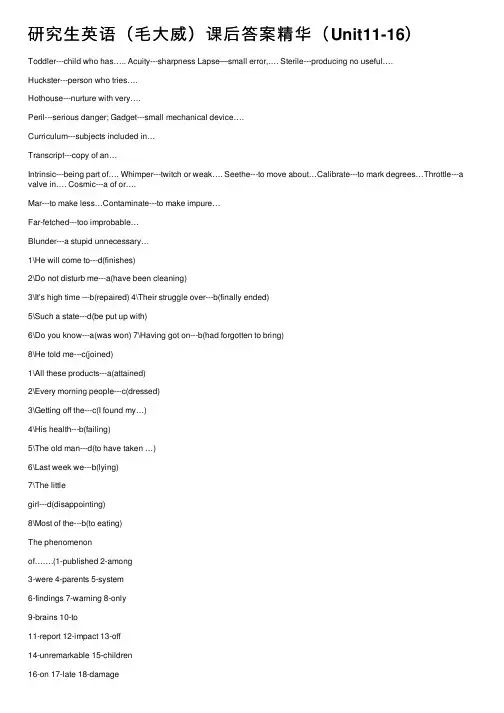
研究⽣英语(⽑⼤威)课后答案精华(Unit11-16)Toddler---child who has….. Acuity---sharpness Lapse—small error,…. Sterile---producing no useful….Huckster---person who tries….Hothouse---nurture with very….Peril---serious danger; Gadget---small mechanical device….Curriculum---subjects included in…Transcript---copy of an…Intrinsic---being part of…. Whimper---twitch or weak…. Seethe---to move about…Calibrate---to mark degrees…Throttle---a valve in…. Cosmic---a of or….Mar---to make less…Contaminate---to make impure…Far-fetched---too improbable…Blunder---a stupid unnecessary…1\He will come to---d(finishes)2\Do not disturb me---a(have been cleaning)3\It’s high time ---b(repaired) 4\Their struggle over---b(finally ended)5\Such a state---d(be put up with)6\Do you know---a(was won) 7\Having got on---b(had forgotten to bring)8\He told me---c(joined)1\All these products---a(attained)2\Every morning people---c(dressed)3\Getting off the---c(I found my…)4\His health---b(failing)5\The old man---d(to have taken …)6\Last week we---b(lying)7\The littlegirl---d(disappointing)8\Most of the---b(to eating)The phenomenonof…….(1-published 2-among3-were 4-parents 5-system6-findings 7-warning 8-only9-brains 10-to11-report 12-impact 13-off14-unremarkable 15-children16-on 17-late 18-damage19-worry 20-don’t)This year Idecided…(1-challenging2-took 3-case4-communication 5-set6-raise 7-aware 8-enough9-No 10-capable) Motorists aremore…(1-objects 2-see3-directed 4-attention5-hands-free 6-missing7-reacting 8-use 9-published 10-issue)1\We shoul(avail—of)2\By means of…(made up for)3\She is trying…(steer)4\Mary was worrying…(unsettling)5\Entering the living…(soothe)6\We notice that…(bilingual) 7\The librarian(assjduously) 8\Many old people…(anarchic)9\They are proposing(radical) 10\This is a…(optimizes)1\His claim to(far-fetched)2\The local police…(went off) 3\When we were…(ballooned)4\The company employed..(loopholes)5\I think perhaps…(hasty)6\If you think…(repulsive)7\Many people think…(repulsive)8\According to Piaget…(gradual)9\Humans cannot catch..(contaminated)10\The bank says..(term)1\The prices at…(excessive) 2\All the students(access)3\They havemade(contribution)4\That tallbuilding(projected)5\Mr.Kane is(available)6\The visitors(marveled at) 7\The witness didn’t(expose) 8\Her excitementwas(apparent)9\I saw him(addressing)10\Every year her(presented) 1\Despite the(error-prone)2\Four years had(elapsed) 3\He just got(commission)4\She(has a right)5\You’d better think(scare off)6\The frequentinterviews(intrusive)7\It was awful(all fingers)8\I received a (courteous)改错1\The concept is(C—who)2\They may not (A—serious) 3\Our task was(D –polar ears)4\It should be(D—another) 5\Together withthe(A—With)6\Although it(C—in the real world)7\The trip to(C—rather)8\While working on(C--three-hour)9\Communication(A—was) 10\This escape(D—with)1\I regret (C—should have planned)2\Investigatorsagreed(C—must/may/could) 3\You musthave(A—couldn’t)4\It was very(D—needn’t)5\You had better(A—省略to) 6\You reallyneedn’t(D—ought to)7\Since the TV(C—may)8\You mustn’t(A—shouldn’t) 9\I was fully(D—should)10\Come whatmust(B—may)1\After the Civil(B—去掉they)2\He was invited(C—to complete改为completing) 3\The president (B–Five-men改为five-man)4\The seeds of(B—their改为his)5\In thetechnique(B—knowing改为known)6\Breaking thesound(A—extra.. 改为extraordinary)7\Babe Ruth played(B--since 改为from)8\Not many young(B enough old改为old enough)。
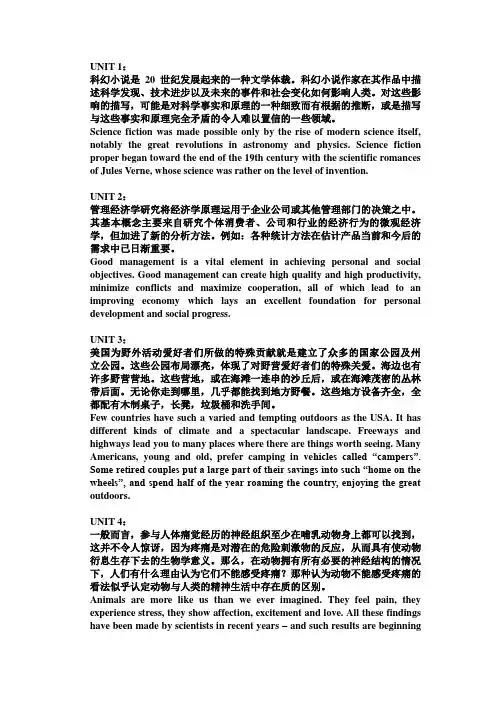
UNIT 1:科幻小说是20世纪发展起来的一种文学体裁。
科幻小说作家在其作品中描述科学发现、技术进步以及未来的事件和社会变化如何影响人类。
对这些影响的描写,可能是对科学事实和原理的一种细致而有根据的推断,或是描写与这些事实和原理完全矛盾的令人难以置信的一些领域。
Science fiction was made possible only by the rise of modern science itself, notably the great revolutions in astronomy and physics. Science fiction proper began toward the end of the 19th century with the scientific romances of Jules Verne, whose science was rather on the level of invention.UNIT 2:管理经济学研究将经济学原理运用于企业公司或其他管理部门的决策之中。
其基本概念主要来自研究个体消费者、公司和行业的经济行为的微观经济学,但加进了新的分析方法。
例如:各种统计方法在估计产品当前和今后的需求中已日渐重要。
Good management is a vital element in achieving personal and social objectives. Good management can create high quality and high productivity, minimize conflicts and maximize cooperation, all of which lead to an improving economy which lays an excellent foundation for personal development and social progress.UNIT 3:美国为野外活动爱好者们所做的特殊贡献就是建立了众多的国家公园及州立公园。
研究生英语(毛大威)课后答案精华(Unit11 16)研究生英语(毛大威)课后答案精华(unit11-16)蹒跚学步的孩子…。
敏锐度——锐度下降——微小误差,…。
无菌的——生产无价值的…。
huckster---personwhotries….温室——养育…。
peril---seriousdanger;小工具——小型机械设备…。
curriculum---subjectsincludedin…抄本…intrinsic---beingpartof….whimper---twitchorweak….seethe---tomoveabout…calibrate---tomarkdegrees…throttle---avalvein….cosmic---aofor….mar---tomakeless…contaminate---tomakeimpure…牵强的---太不可能的…错误---不必要的…2\\donotdisturbme---a(havebeencleaning)3\\t hightime--b(已修复)4\\t他们的艰难跋涉--b(已修复)5\\suchastate---d(beputupwith)6.你知道吗?a(Waswen)7.有Goton--b(Hadfottentobring)8\\hetoldme---c(joined)1\\alltheseproducts---a(attained)2\\everymorningpeople---c(dressed)3\\gettingoffthe--c(ifoundmy…)4\\hishealth---b(failing)5\\theoldman--d(tohavetake…)6\\lastweekwe---b(lying)7\\thelittlegirl---d(disappointing)8.大多数情况下--b(脚趾)的现象……。
(1-published2-among3-were4-parents5-system6-findings 7-warning 8-only 9-brains10-to)motoristsaremo re…(1-objects2-see3-directed4-attention5-hands-free6-missing7-reacting8-use9-published10-issue)1.我们应该(利用)2\\bymeansof…(madeupfor)3\\sheistrying…(转向)4\\marywas令人担忧…(不安)5\\entering the living…(安抚)6\\wenoticethat…(bilingual)7\\thelibrarian(assjduously)8\\manyoldpeople…(ana rchic)9\\t他们提出(激进的)10\\t这是…(优化)1\\thepricesat…(excessive)2\\allthestudents(access)3\\theyhavemade(contributi on)4\\thattallbuilding(projected)5\\mr.kaneis(available)6\\thevisitors(marvele dat)7\\thewitnessdidn’t(ex pose)8\\herexcitementwas(apparent)9\\i突发奇想(寻址)10\\everyyearher(presented)5\\t you'dbetterthink(恐吓)6\\t频繁的评论(侵扰性)7\\t这是可怕的(所有手指)8\\t我收到了(礼貌的)错误纠正1\\theconceptis(c―who)2\\theymaynot(a―serious)3\\ourtaskwas(dcpolarears)它应该是(另一个)和(另一个)6\\althoughit(c―intherealworld)7\\thetripto(c―相反)8\\whileworkingon(c--three-hour)1\\iGret(c―应保留计划)2\\investigators同意(c―必须/可能/可能)3\\n你必须(a―不能)4\\itwasvery(d―needn’t)5\\youhadbetter(a―省略to)6\\youreallyneedn’t(d―oughtto)7\\s incethetv(c―may)1 \\结束后(B--移除)7\\baberuthplayed(b--since改为from)8\\notmanyyoung(从benougold变为oldenough)。
Unit 1 LiteraturePrepare YourselfDo you know ?communication satellite 通讯卫星mobile telephony 移动通讯intelligent robot 智能机器人clone 克隆telecommunications 远程通讯How do you say it ?文学literature科幻小说science fiction空间旅行space traveling外星人alien人类社会human society高技术high-technology信息时代information age信息产业information industryMake up a sentenceIt took 100 years before the moon landings predicted by the French writer Jules Verne actually took place.法国科幻小说家Jules V erne预言的人类登月,整整用了100年才变成现实。
Text 1 What’s the Big Idea?Imagination is more important than knoeledge.Word Glossarysponsor 英['spɒnsə] 美['spɑnsɚ]n. 赞助者;主办者;保证人vt. 赞助;发起prominent 英['prɒmɪnənt]美['prɑmɪnənt]adj. 突出的,显著的;杰出的;卓越的fiction 英['fɪkʃ(ə)n]美['fɪkʃən]n. 小说;虚构,编造;谎言hostile 英['hɒstaɪl]美['hɑstl]adj. 敌对的,敌方的;怀敌意的n. 敌对frivolous 英['frɪv(ə)ləs]美['frɪvələs]adj. 无聊的;轻佻的;琐碎的mutual 英['mjuːtʃʊəl; -tjʊəl]美['mjutʃuəl]adj. 共同的;相互的,彼此的suspicion 英[sə'spɪʃ(ə)n]美[sə'spɪʃən]n. 怀疑;嫌疑;疑心;一点儿vt. 怀疑speculation 英[,spekjʊ'leɪʃn]美[,spɛkju'leʃən] n. 投机;推测;思索;投机买卖remarkably 英[ri'ma:kəbli]adv. 显著地;非常地;引人注目地robotic 美[ro'bɑtɪk]adj. 机器人的,像机器人的;自动的n. 机器人学telephony 英[tɪ'lef(ə)nɪ]美[tə'lɛfəni]n. 电话(学);电话制造predict 英[prɪ'dɪkt]美[prɪ'dɪkt]想vt. 预报,预言;预知vi. 作出预言;作预料,作预报alien 英['eɪlɪən]美['elɪən]adj. 外国的;相异的,性质不同的;不相容的n. 外国人,外侨;外星人vt. 让渡,转让emerge 英[ɪ'mɜːdʒ]美[ɪ'mɝdʒ]vi. 浮现;摆脱;暴露vision 英['vɪʒ(ə)n]美['vɪʒən]n. 视力;美景;眼力;幻象;想象力vt. 想象;显现;梦见dominate 英['dɒmɪneɪt]美['dɑmɪnet]vt. 控制;支配;占优势;在…中占主要地位vi. 占优势;处于支配地位Expressions and Phrasesin reality 实际上;事实上call for 要求;需要;提倡;邀请;为…叫喊in the middle of 在…中间deal with 处理;涉及;做生意in search of 寻找;搜寻play a role in 在……起作用Notes“He backs a company which produces intelligent robots, capable of learning new tasks from their environment.”他主办了一家公司,主要生产智能机器人,这种机器人能够根据它所处环境而学习处理各种任务。
「考研」英语专业考研参考书单随着中国高等教育的普及和提高,越来越多的学生选择报考英语专业的考研,而选择合适的参考书对于考研的成功至关重要。
本文将为大家推荐一套「考研」英语专业考研参考书单,帮助大家更好地备考。
1. 《研究生英语教程》—杜邦德、拉斯金、哈米尔顿作为研究生入学考试的必备参考书,这本教材涵盖了研究生英语考试的各个方面,包括听力、阅读、写作和口语。
该教材注重培养学生的综合能力,通过大量的例子和练习题,帮助学生提高英语应试技巧。
2. 《研究生英语阅读教程》—张道真、莫润楠、曲延松阅读是英语考试的重要部分,这本教材专注于培养学生的阅读能力。
书中包含了丰富多样的文本,涵盖了各个学术领域的内容,帮助学生提高阅读理解和阅读速度。
3. 《研究生英语写作教程》—寇秀英、陶淑洁写作是研究生英语考试的难点之一,这本教材通过给出范文和写作指导,帮助学生提高写作能力。
书中内容涵盖了学术写作、议论文写作和翻译技巧等方面,对于备考考研写作部分非常有帮助。
4. 《研究生英语听力教程》—张双利、李树淼听力是研究生英语考试中重要的一环,这本教材通过大量的听力材料和练习题,帮助学生提高听力理解能力和听写能力。
教材中内容丰富多样,从学术演讲到讨论会,让学生熟悉各种听力场景。
5. 《研究生英语口语教程》—王利芬、杨瑞华口语是考研英语考试的重要部分,这本教材注重培养学生的口语表达能力。
书中提供了各种口语练习题和口语技巧,帮助学生提高口语流利度、语音语调和交际能力。
6. 《考研英语历年真题精析》—张剑随着考研人数的增加,历年真题的重要性也日益突出。
这本书收录了多年来的考研英语真题,并对每一道题目进行了详细的解析。
通过做题和分析解析,学生可以更好地了解考试的出题特点和解题思路。
7. 《考研英语词汇》—王亚敏英语词汇量是考研英语的基础,这本书整理了考研英语中常见的单词和短语。
书中词汇按照频率和重要性排序,帮助学生重点记忆和掌握必备词汇。
全国教育硕士英语(毛大威)学生用书参考全国在职教育硕士英语学生用书第二版Unit 3Unit 3 TravelPrepare YourselfDo you know ?tourist resort旅游胜地landscape scenery 山水风光virgin forest 原始森林hitchhiking 沿途免费搭乘他人便车旅行outdoor adventures户外冒险活动 a camper 野营者How do you say it ?远足hike 兜风go for a ride 观光sight-seeing探险explore, exploration 交游go outing 滑雪skiing冲浪surfing 睡袋sleeping bag 导游图tourist map 夏令营summer campMake up a sentenceOnce in the wilderness, your chief worry will be, not how to avoid other hikers, but how not to get lost!在空旷的野外,你最担心的不是避开旅游高峰,而是怕迷了路!Happiness takes no account of time.Text1 Enjoy the Great OutdoorsFew countries have such a varied and tempting outdoors as the USA. There is every kind of climate except tropical; Arctic in Alaska, Mediterranean in southern California, temperate in the northwest and northeast, subtropical in Florida, desert in Arizona and New Mexico. Death Valley, California, has the most consistently high summer temperature in the world It sometimes persists at 132°F.很少有国家像美国那样具有各种各样诱人的户外活动。
全国在职教育硕士英语学生用书第二版Unit 1-5Unit 1 LiteraturePrepare YourselfDo you know ?communication satellite 通讯卫星mobile telephony 移动通讯intelligent robot 智能机器人clone 克隆telecommunications 远程通讯How do you say it ?文学literature 科幻小说science fiction 空间旅行space traveling外星人alien 人类社会human society 高技术high-technology信息时代information age 信息产业information industryMake up a sentenceIt took 100 years before the moon landings predicted by the French writer Jules Verne actually took place.法国科幻小说家Jules Verne预言的人类登月,整整用了100年才变成现实。
Imagination is more important than knoeledge.Text1 What’s the Big Idea?Nokia sponsors a wide range of educational, cultural and other activities. One of the most u nusual activities was the sponsoring of “Future Histories”, a collection of stories by prominent writers of science fiction .Why should a telecommunications company become involved with literature? It could be called “research”.诺基亚公司举办了一系列有关教育文化的的意义活动。
其中最不寻常的一项活动是举办“未来的历史”,由科幻小说作家们收集的小说故事系列。
为什么一个通讯公司变得与文学有牵涉,它就是所谓的“科学研究”。
Science and literature have traditionally been hostile to each other. Writers have regarded scientists as dull creatures who take pleasure in destroying great words of the imagination with boring facts. Scientists have thought of writers as frivolous people with no respect for the rules of evidence. At the heart of their mutual suspicion is the question of who owns the truth. Does something become real when it is imagined or when it is physically created?科学和文学传统上就相互敌对。
文学作家认为:科学家们是一群愚蠢的生物,他们总是破坏人类伟大的想象取乐。
科学家则认为:文人作家们是轻浮的,没有尊循事实依据,两者相猜疑的中心交点在于:到底是谁拥有真理事实,是先有想像后来成成真呢?还是实际设计出变成真的?Science fiction is the one area where these tow opposing groups have met and exchanged ideas . As its name suggests, science fiction is literature which predicts the technology of the future and the effect this will have on human society .Over the years many of their speculations have been remarkably accurate. Space travel, communications satellites, nuclear power, robotics, cloning and mobile telephony have all appeared in books before they appeared in reality.科幻小说是两大对立集团相互邂逅并交流思想的公共领域。
顾名思义,科学小学是预测未来科技和如何影响人类社会的文学作品。
近年来,许多想象推测早己变成了现实,如太空旅行,通讯卫星,原子核能,机器人,克隆技术和移动电话,它们都是先出现在作品中然后才变成现实的。
Yet sometimes the writers have got it wrong. Nobody predicted the emergence of personal computers, for instance. And contact with alien beings from other planets still seems a long way off, despite being a common subject of science fiction.有时,科幻作家们也会搞错。
从来没有人能预言个人电脑的出现,反之,尽管外星人早己成为科幻作品的描述对象,但到现在,与外星人的联系还有很长一段距离要走。
Over the years, the time between the prediction of new technology in science fiction and its actual discovery has become shorter. It took 100years before the moon landings predicted by the French writer Jules Verne actually took place. The idea of robots first emerged in the 1920s. The first robots were built in the 1970s.And in the 1940s,Arthur.C.Clarke predicted that communication satellites would circle the globe by the year 2000. These arrived 30 years before they were due.近年来,在科幻小说中新技术的预言和它变为现实,两者之间的时间在缩短。
法国科幻小说家儒勒•凡尔纳预言的人类登月,整整用了100年才变成现实。
机器人的设想,再现在19世纪20年代,70年代就真正建成了。
十九世纪小说家科拉克预言,到2000年才能实现卫星通讯,结果提前30年,这一设想就实现了。
Richard Dawkins, a British scientist, recently stated that scientific discovery revealed the beauty and complexity of nature in a way that the human imagination could never do.英国科学家,理查德•道克温斯最近声名:科学发现能够展示大自然的美和复杂性,相反人类的想像则做不到。
Yet this is not the end of the road for science fiction. Many of the developments it has predicted are used for communication and we a re now in what is called the “information age”. And the people who have to do the work complain of “information overload”.然而这并不是科幻小说的粉途末路,它所预言的很多发展正用信息交流,我们正在所谓的“信息时代”,西方国家超过三分之一的人口受聘于信息科技产业。
世界上的领导人倡导“知识型社会”的建立。
人们尽管抱怨“信息负担过重”但还必须从事这一行业。
In the middle of all this, there is a real need for people with vision. The future of business communication depends on the ability to imagine new realities and then produce products andservices for them. In “Future Histories”, one story deals with an investor who const antly travels in search of new opportunities in high technology. He backs a company which produces intelligent robots, capable of learning new tasks from their environment. One day, he notices that the robots have stopped working. Eventually, he realizes that they are asking themselves a question which has never occurred to him. Why are we doing this? Writers in the information age have moved from predicting scientific discoveries of the future. Now they speculate about the effect of the revolution of communication on human society. In a world dominated by business and technology, there is still an important role to be played by people who can answer the question –what’s the big idea?在所有问题中,人们具有想像力是必须的。